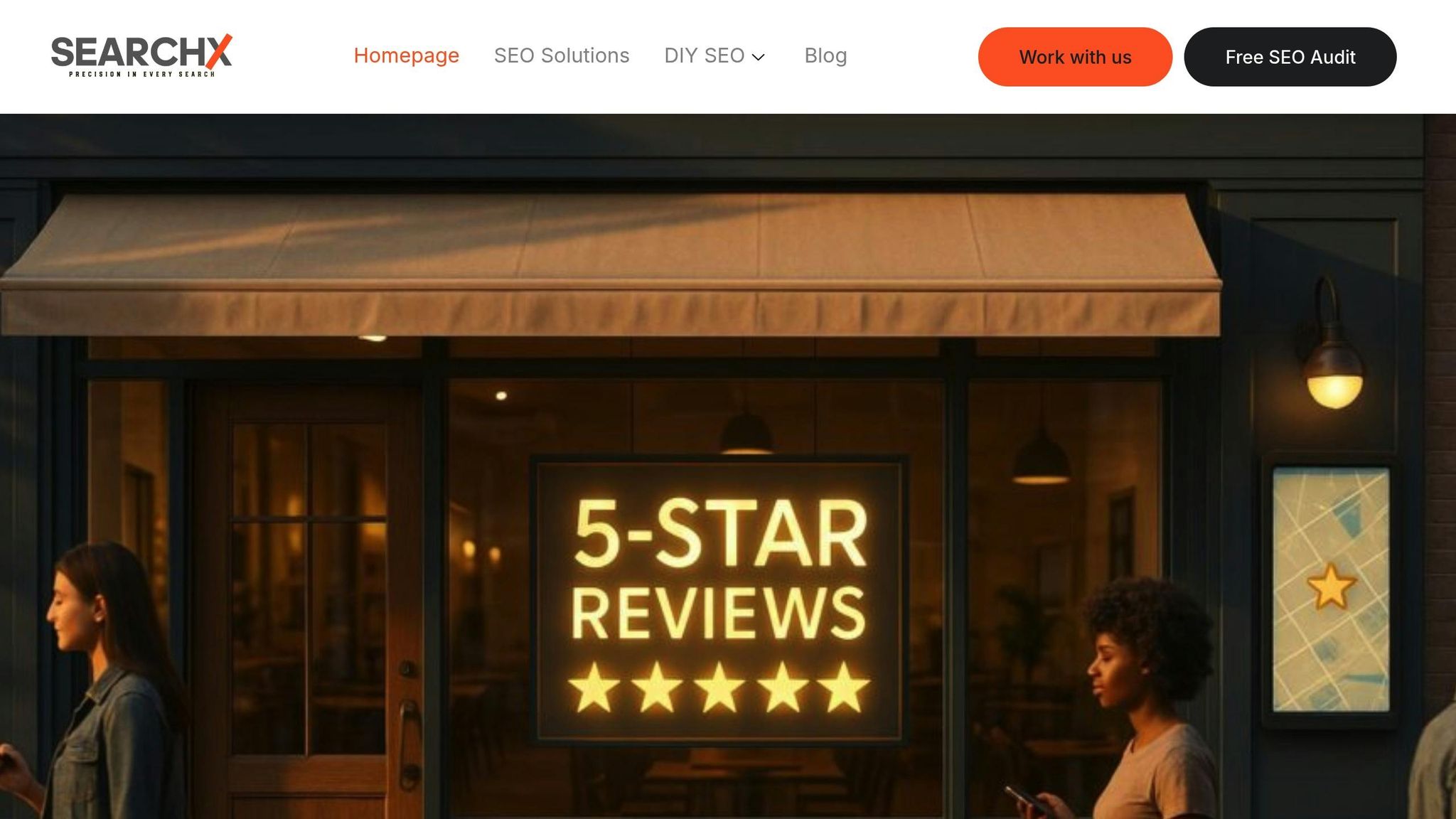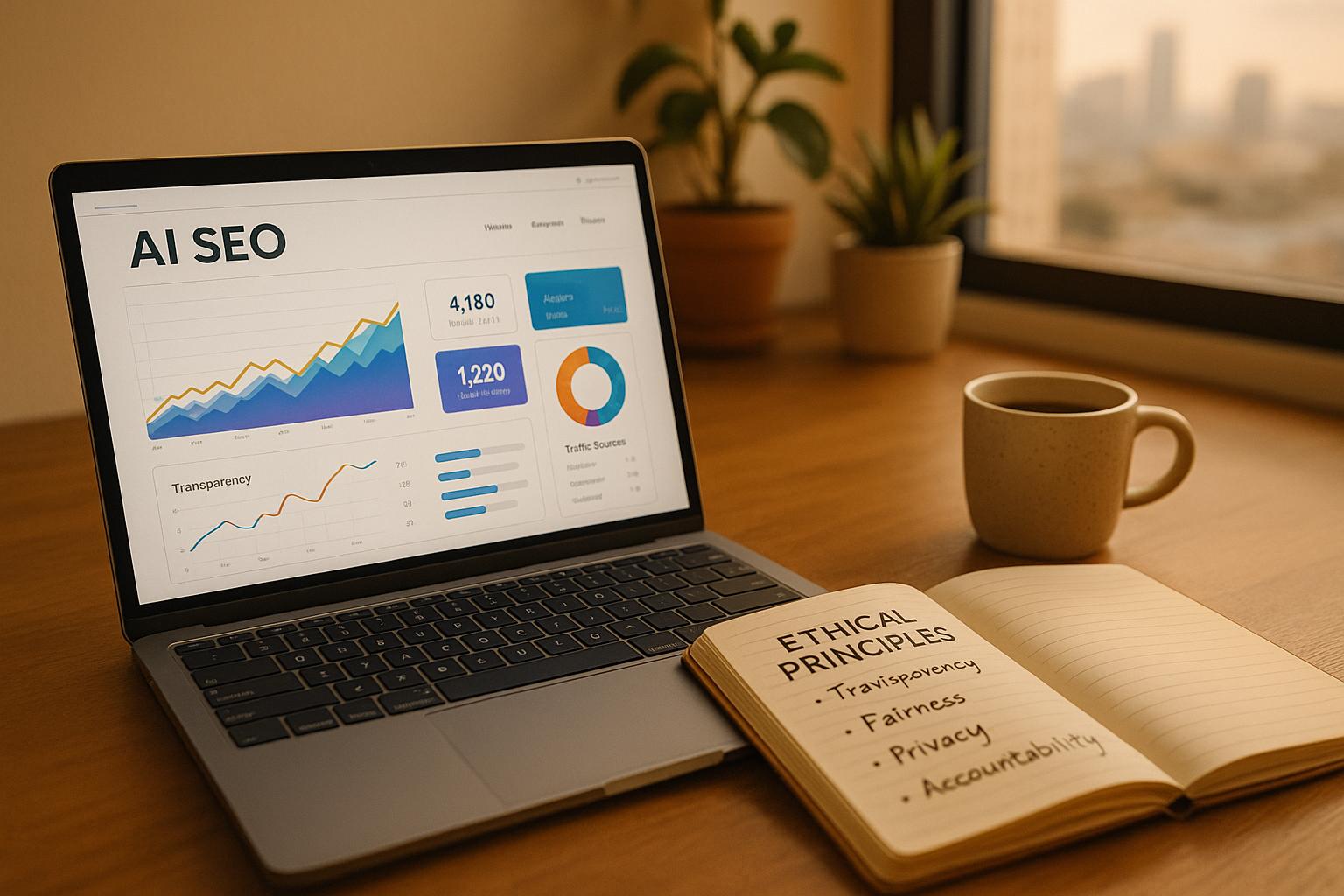AI is transforming SEO, automating nearly half of core tasks like content creation and keyword research. But without ethical guidelines, businesses risk penalties, mistrust, and poor results. Ethical AI in SEO focuses on transparency, fairness, and user-first practices, ensuring content aligns with Google’s E-E-A-T standards (Experience, Expertise, Authoritativeness, Trustworthiness).
Key takeaways include:
- Transparency: Clear communication about AI processes builds trust.
- Data Privacy: Protect user data with strict safeguards and consent policies.
- Human Oversight: Combine AI efficiency with human judgment for accuracy.
- Content Quality: Avoid AI hallucinations, plagiarism, and bias.
Why it matters: With AI-driven SEO, businesses report a 49.2% boost in rankings and 75.4% scalability improvements. But ethical missteps can harm reputation and performance. Tools like those from SearchX help companies manage AI responsibly through audits, monitoring, and user-focused strategies.
Steps for ethical AI SEO:
- Create custom guidelines for data use and content standards.
- Monitor AI systems with automated and human checks.
- Use tools that prioritize compliance and transparency.
Ethical Ways to Use AI in SEO with John McAlpin
Core Principles of Ethical AI SEO
Transparency lies at the heart of ethical AI SEO, fostering trust through open communication about how AI operates and performs. Let’s explore how SearchX embodies this principle.
Transparency in AI Algorithms
SearchX prioritizes clarity by providing real-time updates and complete insight into its AI-driven SEO processes. As the company explains:
"Full Transparency, Every Step of the Way: You’ll always know where your campaign stands. With real-time dashboards and regular updates, we keep you in the loop, so you’re never left wondering about your progress."
This commitment to openness allows businesses to make well-informed decisions while strengthening their trust in SearchX’s services.
Steps to Develop Ethical AI SEO Strategies
Developing ethical AI SEO strategies means finding the right balance between automation and human oversight. This process involves setting clear guidelines, monitoring AI systems closely, and using tools that prioritize compliance and transparency. Here’s how to approach it step by step.
Creating Custom Ethical Guidelines
To start, build a strong ethical foundation by creating internal guidelines tailored to your organization. Bring together your SEO team, data privacy officers, legal experts, and business leaders to define how AI will be used responsibly. These guidelines should cover how user data is handled, ensure content remains genuine, and promote transparency in automated workflows.
A key focus should be on data collection and usage policies. Clearly outline what kinds of user data your AI systems can access, how long the data can be stored, and who can view it. Make sure there are protocols for obtaining user consent, and provide users with simple ways to opt out if they don’t want their data used in AI training.
Another important element is content authenticity standards. These standards should specify when AI-generated content needs to be labeled and when human review is mandatory. This helps maintain audience trust and ensures compliance with regulations around AI-generated material.
Since the digital landscape evolves quickly, review your ethical guidelines regularly. Schedule quarterly updates to address changes in AI capabilities, new regulations, or shifts in SEO best practices.
Monitoring and Evaluating AI Systems
Ongoing monitoring is essential to ensure your AI systems stay within ethical boundaries while delivering effective SEO results. Use automated audits to track content quality, engagement levels, and potential biases across different demographics. Go beyond traditional SEO metrics by including indicators of ethical compliance.
Pay close attention to how your AI systems handle sensitive topics, whether they produce consistent outcomes for all user groups, and if they maintain accuracy over time. Set up alerts to flag unusual patterns that could indicate bias or problems with data quality.
Regular human oversight is equally important. Conduct weekly reviews of AI-generated content, monthly keyword analyses, and quarterly evaluations of overall performance. These checks help catch issues early, preventing them from affecting your SEO strategy or user experience.
Detailed documentation is another critical step. Keep records of AI decision-making processes, changes to algorithms or training data, and the results of ethical compliance reviews. This documentation not only ensures accountability but also provides a valuable resource for regulatory inquiries or system improvements.
Using SearchX Tools for Ethical SEO

SearchX offers a suite of tools designed to integrate ethical practices into every aspect of your SEO strategy. These tools focus on transparency, quality, and user trust.
For example, the platform’s keyword research tools filter out potentially harmful or misleading keywords, prioritizing terms that align with user intent and business values. This ensures your content stays relevant and responsible.
The technical SEO audit tools help identify ethical risks in your site structure and content delivery. These audits can uncover issues like accessibility barriers, duplicate content, or deceptive practices that could harm user experience or violate search engine guidelines.
SearchX also emphasizes human-AI collaboration in content creation. Its tools provide AI-powered suggestions for research and initial drafts, but human review and approval remain central to the process. This ensures content is both high-quality and authentic while benefiting from AI’s efficiency.
Finally, the platform’s performance measurement tools track both traditional SEO metrics and ethical compliance indicators. You can monitor how your AI-driven strategies perform across various user groups, identify biases in content recommendations, and evaluate the long-term impact of your SEO efforts.
From strategy development to ongoing optimization, SearchX’s SEO solutions help you maintain transparency, protect user privacy, and build a trustworthy online presence. By combining powerful tools with ethical practices, you can create AI-driven SEO strategies that are not only effective but also responsible.
Challenges and Solutions in Ethical AI SEO
Navigating the world of ethical AI in SEO isn’t without its hurdles. From ensuring data quality to balancing automation with human oversight, these challenges can make or break your strategy. But with the right approach, these obstacles can be tackled effectively.
Ensuring Data Quality
Bad data is the Achilles’ heel of AI-driven SEO. When algorithms rely on incomplete, outdated, or biased datasets, the results can be misleading – and even harmful – to your search rankings and user experience. The problem is compounded when data from multiple sources conflicts, creating a confusing picture for your AI to interpret.
One major issue is data inconsistency. For example, search behavior data from different time periods, regions, or demographics often sends mixed signals. Outdated data can further complicate things, steering strategies toward tactics that no longer align with current algorithms or user preferences.
To combat these issues, consider these steps:
- Automated validations and regular audits: Use automated tools to flag outdated or inconsistent data, and schedule monthly reviews to clean up irrelevant or corrupted information.
- Diversify your data sources: Pull from a mix of search console data, user analytics, industry reports, and competitor analysis for a broader perspective.
- Real-time monitoring: Implement systems that continuously check data accuracy and alert your team to anomalies. This helps ensure your AI bases recommendations on reliable data.
Once data quality is under control, the next hurdle is finding the right balance between automation and human input.
Balancing Automation and Human Oversight
AI can process vast amounts of data and identify patterns that humans might overlook. But it often lacks the ethical reasoning and contextual understanding that only people can provide. This becomes especially tricky when dealing with sensitive content topics, where AI might suggest strategies that are technically effective but ethically questionable.
The solution? Build clear checkpoints into your process. Here’s how:
- Human review for AI recommendations: Set up a system where routine decisions can move forward with minimal oversight, but more strategic or sensitive changes require a thorough review by experts.
- Collaborative workflows: Use AI to generate insights and initial recommendations, then have your SEO team evaluate these against ethical guidelines and business goals.
- Training and escalation protocols: Train your team to know when to trust AI and when to step in. Establish clear protocols for escalating complex decisions that need human judgment.
This approach ensures that while AI handles efficiency, humans maintain the ethical and strategic direction of your SEO efforts.
Preventing the Spread of Misinformation
AI-generated content can inadvertently spread misinformation, especially when it pulls from unreliable sources. This issue is particularly critical in industries where accuracy directly impacts user safety, financial decisions, or health outcomes.
The problem arises when AI systems amplify false information from their training data, perpetuating inaccuracies across content and campaigns. To address this, you need robust fact-checking mechanisms:
- Multi-layer verification: Cross-reference AI-generated content with authoritative sources and combine automated checks with human reviews.
- Authoritative source databases: Curate a list of trusted sources for your industry and configure your AI tools to prioritize these. Regular updates to this database are essential.
- Content flagging systems: Set up alerts to flag content with disputed facts, controversial claims, or inaccuracies. This gives your team the chance to verify and correct before publication.
- Correction protocols: Have a clear plan for addressing mistakes. This includes updating content, notifying users, and improving systems to prevent future errors.
For example, SearchX incorporates built-in verification tools that cross-reference content with trusted industry sources. The platform also requires human approval for all AI-generated material, ensuring accuracy checks happen before anything goes live. This blend of automated systems and human oversight helps maintain content quality and prevents the spread of false information.
Ethical AI in SEO may be complex, but with these strategies, you can tackle the challenges head-on while maintaining the integrity of your content and your brand.
Conclusion and Key Takeaways
Creating ethical AI SEO strategies isn’t just a nice-to-have; it’s a must for sustainable growth and building trust in the long run. As search engines get smarter and users expect more transparency, businesses prioritizing ethical practices can gain a real edge over the competition.
Ethical AI Principles at a Glance
Ethical AI in SEO boils down to four main principles:
- Transparency: Be upfront about how your AI tools function and the data they rely on. This helps stakeholders understand and trust the recommendations AI provides.
- Data privacy and security: Handle user data responsibly. Get proper consent, store it securely, and use it only for its intended purposes.
- Bias reduction: Regularly audit AI systems to spot and fix any unfair advantages or discriminatory patterns.
- Human oversight: AI can do a lot, but it can’t replace human judgment. Having people involved ensures decisions are made with context and ethical reasoning.
These principles serve as a roadmap for keeping integrity at the heart of every AI-driven choice.
Steps Businesses Should Take
To put these principles into practice, businesses need to act with intention. Here’s how:
- Audit your AI tools: Check for bias, gaps in data quality, and areas where oversight might be lacking.
- Set ethical guidelines: Define clear rules for how data is used, how content is created, and how decisions are made.
- Monitor regularly: Use automated alerts and schedule periodic human reviews to catch issues early.
- Train your team: Make sure your employees understand both the capabilities and the limits of AI.
How SearchX Can Help
Executing these steps effectively often requires expertise, and that’s where SearchX comes in. They offer SEO solutions that balance automation with ethical practices. Their services include:
- Technical SEO audits to ensure your website meets search engine requirements.
- Keyword research to identify opportunities while maintaining ethical standards.
- Comprehensive SEO solutions that combine automation with human oversight to boost performance while staying compliant.
By partnering with SearchX, businesses can streamline the process of implementing ethical AI in SEO. Their expertise allows you to focus on growth without compromising on trust or transparency.
The future of SEO will favor those who use AI responsibly. With clear principles, thoughtful processes, and the right support, your business can build a solid foundation of trust – both with search engines and your audience.
FAQs
How can businesses create ethical and transparent AI-driven SEO strategies?
To keep AI-driven SEO strategies both ethical and transparent, businesses should focus on openness and integrity in their AI processes. This means clearly explaining how AI tools work – whether it’s ranking content or analyzing data – and consistently reviewing these systems to identify and address any biases.
Regular audits and human oversight play a critical role in ensuring accountability and building trust. Following established ethical guidelines and industry standards helps ensure these practices remain transparent and fair, strengthening credibility with both users and search engines.
What are the most common ethical challenges in AI-powered SEO, and how can they be addressed?
Ethical Challenges in AI-Powered SEO
AI-powered SEO brings impressive capabilities, but it also introduces some ethical challenges. Among the most pressing are algorithmic bias, data privacy concerns, and lack of transparency. These issues can result in unfair practices, spread misinformation, or even erode user trust.
So, how can businesses navigate these challenges responsibly? Here are a few key steps to consider:
- Protect user data: Safeguard data and respect privacy at every stage of your SEO process.
- Keep human oversight in the loop: Always have people reviewing AI-generated outputs to ensure accuracy and fairness.
- Be upfront about AI usage: Clearly communicate how AI tools are integrated into your SEO strategies.
By focusing on fairness, accountability, and openness, businesses can create AI-driven SEO strategies that not only meet industry expectations but also earn the trust of their audience.
How does human oversight improve the quality and reliability of AI-generated SEO content?
The Importance of Human Oversight in AI-Generated SEO Content
Human oversight is essential for ensuring the quality and reliability of AI-generated SEO content. While AI is fantastic at crunching data and coming up with ideas, it can sometimes miss important details, like staying true to a brand’s voice, addressing cultural nuances, or handling ethical concerns. A human touch helps verify that the content is accurate, relevant, and free of bias or misinformation.
This partnership between humans and AI ensures that content meets high standards, aligns with industry expectations, and earns your audience’s trust. By blending AI’s speed and efficiency with human insight, businesses can create SEO strategies that are not only effective but also responsible.




